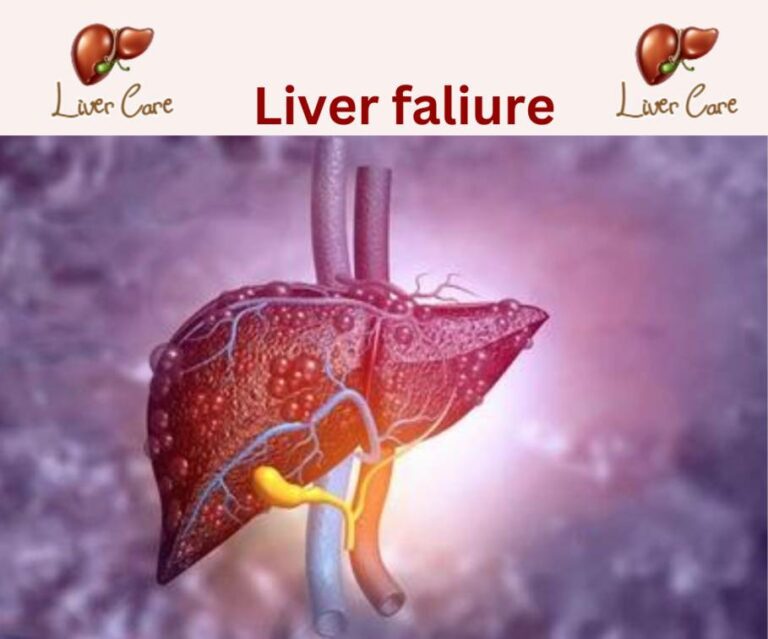Acute chronic liver failure treatment in Bangalore
What is Liver faliure
Liver failure is a grave condition wherein the liver loses its ability to function effectively, impacting vital bodily processes such as metabolism, detoxification, and protein production. This dysfunction can lead to a cascade of complications affecting multiple organ systems. Liver failure can manifest suddenly (acute liver failure) or develop gradually over time (chronic liver failure). Common causes include viral hepatitis, alcoholic liver disease, non-alcoholic fatty liver disease (NAFLD), autoimmune liver diseases, drug-induced liver injury, and cirrhosis.

What is Acute Liver Failure (ALF)
ALF is a rare but life-threatening condition characterised by the sudden loss of liver function within days or weeks in individuals with no pre-existing liver disease. It requires immediate medical attention, as it can lead to severe complications and even death if left untreated. ALF can be caused by various factors, including viral infections, exposure to toxins such as acetaminophen overdose, autoimmune hepatitis, Wilson’s disease, Budd-Chiari syndrome, acute fatty liver disease during pregnancy, and excessive alcohol consumption.
Symptoms of acute liver failure (ACLF)
The symptoms of acute liver failure can vary from person to person, but may include:
- Jaundice: yellowing of the skin and eyes
- Abdominal pain and swelling
- Nausea and vomiting
- Fatigue and weakness
- Confusion and disorientation
- Easy bruising and bleeding
- Dark urine
- Pale-coloured stools
What is Acute Chronic Liver Failure (ACLF)
ACLF is a severe condition characterised by the rapid deterioration of liver function in individuals with pre-existing chronic liver disease. It represents a critical stage in the continuum of liver disease, often leading to multiple organ failure and a high mortality rate. ACLF typically arises in patients with underlying chronic liver diseases such as cirrhosis and hepatitis B or C, alcoholic liver disease, NAFLD, or autoimmune liver diseases. The exact mechanisms underlying ACLF development are not fully understood but involve factors such as hepatic insults, systemic inflammation, and impaired hepatic regeneration.
Symptoms of acute chronic liver failure (ACLF)
- Jaundice
- Ascites
- Hepatic Encephalopathy
- Fatigue and weakness
- Easy bruising and bleeding
- Oedema
- Gastrointestinal Symptoms
- Portal hypertension-related symptoms
- Muscle Wasting
- Changes in Skin Appearance
- Fluid Retention
- Weight Loss
Acute chronic & Acute liver failure treatment in Bangalore
Comprehensive liver care in Bangalore, led by Dr. Rajiv Lochan, offers expert treatment for acute, chronic, and acute liver failure. With advanced medical interventions and personalized care, Dr. Rajiv Lochan ensures optimal management of liver conditions, enhancing patients’ quality of life and fostering recovery.
Identification and Management of Underlying Causes
- ALF: Identification and prompt cessation of the precipitating factor are crucial. This may involve discontinuation of hepatotoxic medications, antiviral therapy for viral hepatitis, or administration of N-acetylcysteine for acetaminophen overdose.
- ACLF: Treatment focuses on addressing both acute insults and underlying chronic liver disease. Management involves identifying and treating precipitating factors while optimising the management of the underlying condition
Long-Term Management:
- ALF focuses on preventing future episodes and optimising liver health post-recovery.
- ACLF requires close, long-term monitoring and management of underlying chronic liver disease to prevent further decompensation and improve outcomes.
Monitoring and Complication Management
- ALF: Close monitoring of liver function tests, coagulation parameters, and mental status is necessary to assess disease progression. Complications such as hepatic encephalopathy and infections should be promptly recognized and managed.
- ACLF: Monitoring for complications such as hepatic encephalopathy, renal failure, and sepsis is crucial. Management may involve interventions such as lactulose therapy, renal replacement therapy, and antimicrobial treatment.
Liver Transplantation
- ALF: Considered in cases refractory to medical management or with irreversible liver damage.
- ACLF: May be an option for selected patients meeting liver transplant criteria, though decision-making is complex due to underlying chronic liver disease.
Supportive Care
- ALF: Intensive supportive care is vital to maintain organ function and prevent complications. This includes monitoring vital signs, fluid balance, electrolytes, and nutritional support.
- ACLF: Similar to ALF, supportive care is essential in ACLF but may require more aggressive fluid and electrolyte management due to the presence of chronic liver disease.
It’s only knowledge purpose and crucial to consult with a Best liver surgeon in Bangalore healthcare professional for proper diagnosis and treatment recommendations tailored to the individual’s specific condition.
